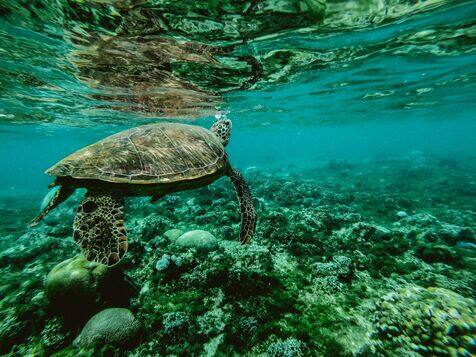Coral Reefs in Crisis: ocean news articles and Updates
Coral reefs, often referred to as the “rainforests of the sea,” are some of the most diverse and productive ecosystems on Earth. They provide essential services to both marine life and humans, offering habitats for countless species, protecting coastlines from erosion, and supporting. Local economies through tourism and fishing industries. However, recent ocean news articles have highlighted a concerning trend—coral reefs are in crisis, facing unprecedented threats that could lead to their irreversible decline.
The Threats to Coral Reefs
The primary threat to coral reefs is climate change, which has led to rising ocean temperatures. Corals are highly sensitive to temperature fluctuations, and even a slight increase in sea temperature can trigger coral bleaching. During bleaching events, corals expel the algae (zooxanthellae) that live within their tissues, causing them to lose their vibrant color. Without these algae, corals are deprived of their main source of food, weakening them and leaving them vulnerable to disease and death. Prolonged bleaching events can result in large-scale coral mortality, and in some cases, entire reef systems can be wiped out.
Ocean acidification, another consequence of climate change, is also wreaking havoc on coral reefs. As the concentration of carbon dioxide (CO2) in the atmosphere rises, more of it is absorbed by the oceans, causing the water to become more acidic. This acidification makes it more difficult for corals to build their calcium carbonate skeletons, which are crucial for their survival. The weakening of coral structures affects not only. The coral itself but also the entire marine ecosystem that depends on it.
Overfishing and destructive fishing practices further exacerbate the crisis. The use of dynamite or cyanide to catch fish damages the delicate coral structures, sometimes causing irreparable harm. Additionally, the depletion of fish populations disrupts the balance of the reef ecosystem, making it more difficult for corals to thrive. Coastal development, including the construction of resorts, harbors, and residential areas, also leads to habitat destruction, sedimentation, and pollution that can smother corals and limit their growth.
The Global Impact of Coral Reef Loss
The decline of coral reefs has far-reaching consequences. It is estimated that over 500 million people around the world rely on coral reefs for food, income, and protection from storms. The loss of coral reefs would result in the loss of biodiversity, as many species. Rely on the reefs for shelter, breeding grounds, and food sources. These ecosystems are home to approximately 25% of all marine species, including fish, invertebrates, and marine mammals.
Coral reefs also play a critical role in protecting coastlines. They act as natural barriers, absorbing the energy of waves and storms, which helps prevent erosion and reduces the impact of natural disasters. Without healthy reefs, coastal communities become more vulnerable to the effects of rising. Sea levels and increased storm intensity, both of which are intensified by climate change.
Tourism, a major industry in many coastal areas, also depends on the health of coral reefs. Snorkeling, diving, and other recreational activities attract millions of visitors to coral-rich regions each year, generating billions of dollars in revenue. The degradation of these reefs not only. Reduces biodiversity but also threatens the livelihoods of those who rely on tourism as a source of income.
Conservation Efforts and Solutions of ocean news articles
Despite the alarming situation, there are reasons for hope. Many organizations, governments, and individuals are working tirelessly to protect and restore coral reefs. One of the most promising efforts is the restoration of coral reefs through coral gardening and transplantation. In this process, scientists cultivate coral fragments in nurseries before transplanting them onto degraded reefs. This method has shown some success, particularly in areas that experience frequent bleaching events. By using genetically resistant coral species and enhancing the resilience of transplanted corals, scientists hope to create more robust and climate-resistant reefs.
Marine protected areas (MPAs) have also proven effective in preserving coral ecosystems. By designating specific areas where human activities are restricted, MPAs allow coral reefs to recover and thrive without the pressures of fishing, tourism, and coastal development. Many countries, including Australia with its Great Barrier Reef, have established MPAs to safeguard these valuable ecosystems. However, more work is needed to expand the network of MPAs and enforce their regulations.
The implementation of sustainable fishing practices is another key solution to preserving coral reefs. Reducing overfishing, banning destructive fishing methods, and promoting sustainable aquaculture can help maintain the health of coral ecosystems. Many fishing communities are also getting involved in reef conservation by adopting practices that reduce bycatch and habitat destruction.
Addressing climate change is perhaps the most critical aspect of coral reef conservation. Reducing carbon emissions, transitioning to renewable energy sources, and promoting sustainable practices are all vital steps toward mitigating the impacts of climate change. International agreements such as the Paris Agreement aim to limit global temperature rise, which would provide coral reefs with a better chance of survival. Additionally, some researchers are exploring innovative approaches. Such as geoengineering and assisted evolution to help corals adapt to changing conditions, though these methods are still in the experimental stages.
Raising Awareness and Advocacy
Public awareness is crucial in the fight to save coral reefs. Ocean news articles, documentaries, and social media campaigns have played a significant role in educating people about the importance of coral reefs and the threats they face. By engaging the public, scientists and conservationists hope to inspire action and generate support for policies that protect these ecosystems.
Individuals can also contribute to coral reef conservation by making sustainable choices, such as reducing their carbon footprint, supporting sustainable seafood, and participating in beach cleanups. By making small changes in their everyday lives, people can help reduce. The pressures on coral reefs and contribute to their long-term survival.
Conclusion
Coral reefs are in crisis, but the global community is beginning to take action. With concerted efforts to reduce the impacts of climate change, restore damaged reefs, and implement sustainable practices, there is hope for these vital ecosystems. However, time is running out, and urgent action is needed to prevent further degradation. Through continued research, conservation efforts, and public engagement, we can protect coral. Reefs for future generations and ensure that these extraordinary ecosystems continue to thrive in our oceans. For the latest updates on coral reef conservation and related ocean news articles, stay informed and get involved. The fate of coral reefs lies in our hands.




